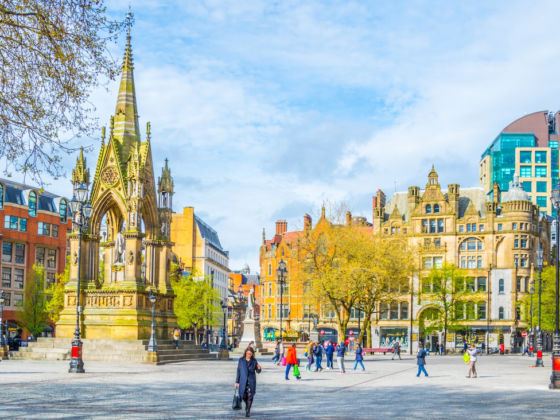

From some of the most famous bands to the biggest football club in the world to the first computer, Manchester, England, is the global blueprint of the modern city. So many social, cultural, political, and technological firsts took place here that you can't walk down the street without bumping into some details of historical importance.
The once common image of a gray, industrial place has been surpassed in recent years by the redevelopment of traditional neighborhoods into easy-going enclaves of great food and drink; the city center is crowded with shining new towers which overlook some of the UK’s best scenery. From the Ribble Valley in the north to the Peak District in the south, Manchester sits at the heart of a countryside landscape that encompasses everything from rolling green farmland to mature country parks to wild moorlands.
Although Manchester’s climate is not extreme in any season, it’s well-known for having spells of prolonged rain — most common from January to March — for which you might need a raincoat and some spare socks. The best and most temperate time to visit is during the spring and early summer months from April to June when the cherry blossoms in the parks give the city a warm glow. High summer, in July and August, can be unpredictable in terms of rainfall, but generally, the temperature stays around a reliable 64 degrees Fahrenheit. The fall months between September and November can be a real treat, with the countryside colors developing into rich hues of orange and brown, while the temperatures stay pleasant enough for walks and days out. Winter, from December to February, is likely to be wet and much colder but temperatures rarely dip below zero degrees and snow is infrequent.
The British pound currently converts at a rate of around £0.74 per 1 USD. Although tipping is on the increase, it’s not widely practiced. In many restaurants, now a voluntary service charge between 10 percent and 12 percent will automatically be added to your bill. You are free not to pay it or to change the amount, but if you do wish to leave a tip then this is a good guide to meet staff expectations. On the whole, 10 percent would also be adequate for exceptional bar or hotel staff, but this is less common than in restaurants. For longer taxi rides or tour guides, you may choose to round up the cost of a trip.
If you speak English then you’re in luck because so do Mancunians. Like most provincial British towns and cities, we do have our own take on the language, which the Queen wouldn’t necessarily recognize. Here’s a little primer to some common phrases:
Manchester sits at the heart of a large and reliable public transport network that can get you just about anywhere, locally or internationally. The airport is busy and serves a wide number of countries around the world. Getting to town from the airport is easy, with the best options being either a cheap, short train journey to Manchester Piccadilly (around $5.30 one way), or a more expensive and longer taxi ride (approximately $40, depending on traffic).
Once in town, your best option is the tram network, which not only covers many of the major tourist highlights such as Old Trafford and MediaCityUK, but which will also take you to green and leafy suburbs and towns nearby. Trams run from 6:00 AM to just before midnight and will cost you just under $10.50 for a day pass. If you’re out late then a bus may also be a good option — they’re safe and frequent. All these services are run by Metrolink, and all the details you’ll need will be on its website.
For shorter town journeys, taxis and Uber are both available and perfectly safe, though they can be expensive. Walking is an excellent way to see the city and is manageable.
Traffic and potholes can be heavy and unpredictable in the city center, so cycling may be better left to locals.
Like most places, there are examples of petty crime and public disorder, but on the whole the city is a safe one. Anywhere that tourists are likely to visit will be fine, assuming you don’t start walking by the canals or visiting pitch-black parks in the dead of night. Pickpocketing and scams aren’t common, though begging is.
Although the city center and most of the suburbs will feel unthreatening, there are some areas within Longsight, Gorton, Moss Side, and parts of Salford that the wary may be best to avoid. Cheetham Hill, just north of the city, is known as the counterfeit clothing capital of the UK and is rife with crime, so stay away.
One extremely saddening but noticeable thing in recent years has been the growth of homelessness and drug use in the city center. This is most common now in Piccadilly Gardens and near Market Street, but the areas remain safe.
Head to these National Trust sites for centuries-old mansions and cute deer.
The sights, stadiums, and saloons that sports lovers shouldn’t miss.
Four days might seem short, but in the UK, where it's easy to get around by train, that's plenty of time to see and enjoy more than one city. In this video we follow Jacob and Esther Fu, the dynamic duo otherwise known as Local Adventurer, as they first experience memorable moments in London before taking in the sights of Manchester, only a 2-hour train ride away.